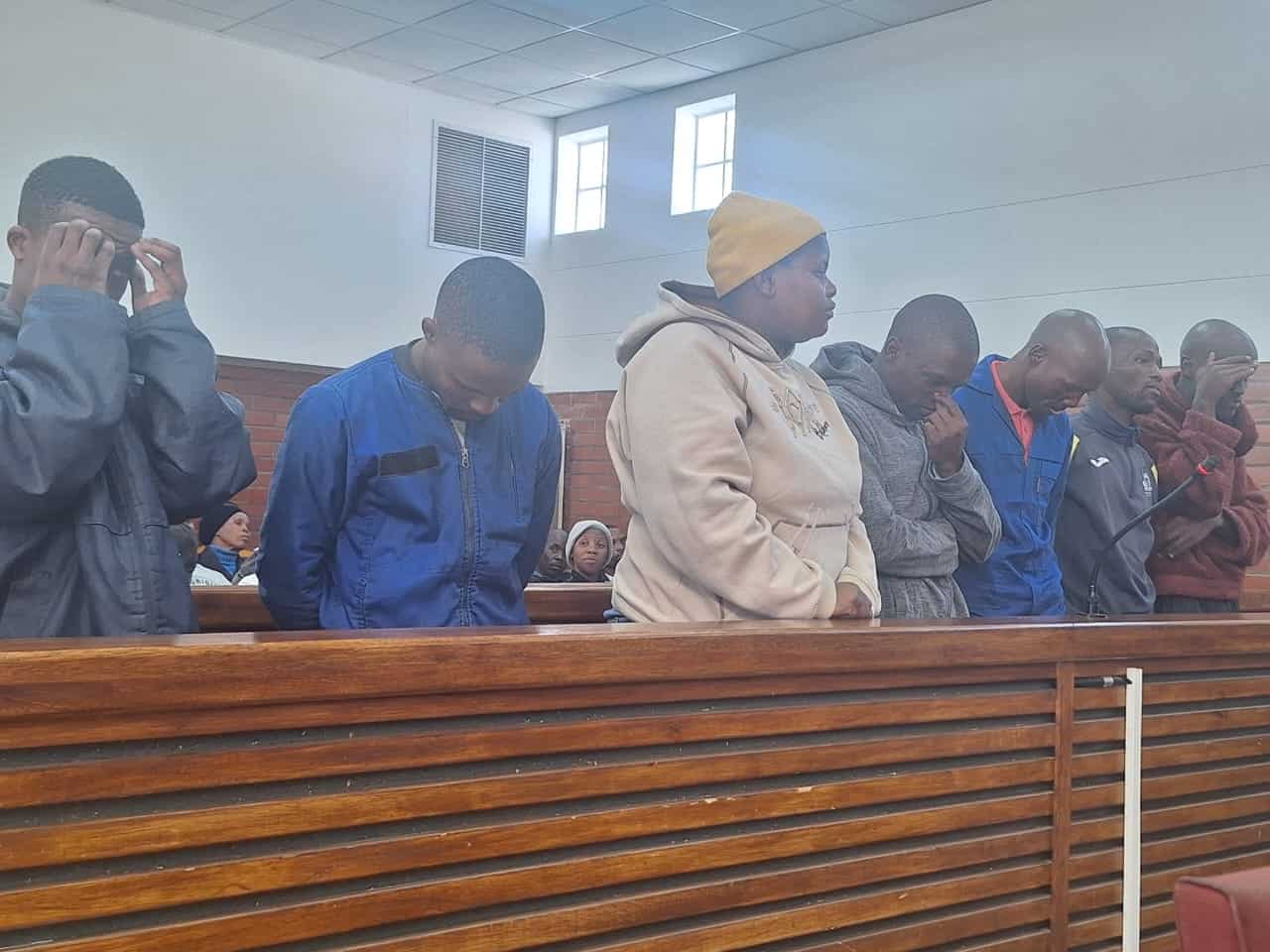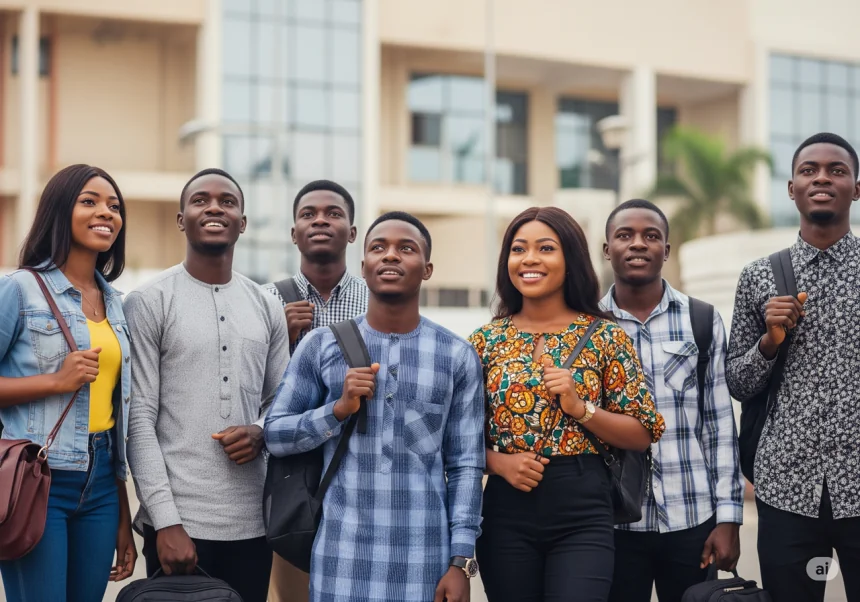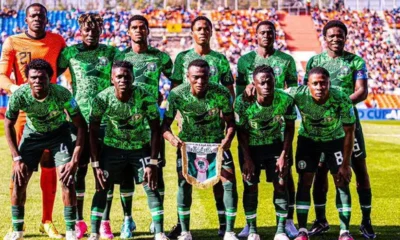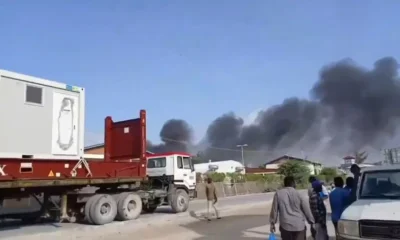Headline
Seven Sentenced To Life Imprisonment In S’Africa For B*rning Two Sisters To D@ath Over Alleged Witchcraft
Published
12 months agoon
By
Editor
Seven people have been sentenced to life imprisonment in South Africa for b*rning two sisters to death after they were accused of witchcraft.
The High Court of South, Eastern Cape Division, Mthatha, sitting in Ntabankulu, sentenced Lwandiso Mzaza (29), Lufefe Mzaza (28), Zithini Rhayisa (34), Yamkela Nonjojo (31), Odwa Nonjojo (34), Anelisiwe Nonjojo (32) and Mkhonzeni Ngcabangcosi (24) on Friday, July 12, 2024.
NPA Regional Spokesperson, Eastern Cape Division, Luxolo Tyali, in a statement, said the court found them guilty of two counts of murder and arson for which they were sentenced to two life terms and ten years, respectively, ordered to run concurrently.
“The Mzazas and Nonjojo’s are biological brothers while all the convicted persons are from the Ngonyama Administrative Area in the district of EmaXesibeni (formerly Mount Ayliff), where the crimes were committed,” the statement read.
READ ALSO: Secret Service k!ll Man Who Shot At Trump In Failed Ass@ssination Attempt [VIDEO]
“On 12 December 2018, the group of young people had two meetings that were chaired by the older Mzaza brother, Lwandiso, where it was decided that the deceased must be k!lled by burning them because they were practising witchcraft
“They clubbed money and bought petrol to burn the deceased, their houses, and their families. On the night of the same day, Nothethisa Ntshamba was at her home with her husband, three children and her sister, Ntombekhaya Ndlanya.
“When Nothethisa went out of the house, accompanying her sister home, they were accosted by the group, assaulted, pelted with stones, petrol poured on them and then set alight. The group then proceeded to burn the Ntshamba homestead to ashes
“During the trial, all the accused pleaded not guilty and put into question their identity as they claimed it was at night. Rhayisa, who had confessed to the police attempted to distance herself from it, necessitating a trial-within-a-trial. The court found the confession admissible. The state further led the evidence of the eyewitnesses, some being the children of the deceased.
READ ALSO: Olowu Of Kuta @60: NUJ OSBC Chapel Celebrates Patron, Describes Him As Blessing
“Senior State Advocate Mbulelo Nyendwa submitted to the court that violence against women accused of unfounded claims of practising witchcraft was very prevalent not only in the Eastern Cape but in the country at large.
“He added that the children of the deceased had not only lost their mothers but had been displaced, fearing for their lives and still carrying the stigma of being called the children of witches by some members of the community.
“Judge Nozuko Mjali agreed and noted that no self-respecting state can condone what the accused did, and they deserved to be punished severely punished, as a society must be protected from people who do not respect the law.
“This court alone has lost count of cases of this nature in this Ntabankulu circuit alone,” she remarked.
You may like


Again, Nigerian Pastor Acquitted Of Rape, To Leave South Africa


S/African President Meets Trump Over Rising Tensions


S/African Court Acquits Nigerian Pastor Of Rape, 31 Other Charges


U17WCQ: Nigeria’s Flamingos Trounce South Africa, Soar To Next Round


South Africa Govt Detains Miss Universe Nigeria, Chidinma Adetshina’s Mother For Alleged Forgery


AFCON U20: Nigeria To Battle Egypt, South Africa, Morocco In Group B
Headline
Want To Study Abroad? Here Are 7 Smart Tips To Help You Get Started And Succeed
Published
5 hours agoon
July 5, 2025By
Editor
Studying abroad is one of the best decisions any Nigerian student can make. It opens doors to world-class education, international exposure, and better career opportunities.
Contents
1. Set clear goals
2. Choose the right country and school
3. Start your application process early
4. Search for scholarships and funding opportunities
5. Prepare for visa application and travel documents
6. Join a community or connect with alumni
7. Learn basic survival skills
But the process can feel overwhelming. Where do you start? What should you prepare? How can you get funding? To make things easier, we’ve put together these 7 simple but powerful tips to study abroad
1. Set clear goals
Before you even pick a country, take time to think about why you want to study abroad. Is it for better quality education, a specific course, or job opportunities after graduation?
READ ALSO:Top 10 Courses To Study In Germany For High Employment Opportunities
Your goals will determine the best destination, school, and course for you. Don’t choose a country just because your friend is there or it sounds fancy. Think long-term.
2. Choose the right country and school
Some countries are better for certain courses. For example, Canada is popular for tech and healthcare courses, Germany is known for engineering, while the UK is great for business and social sciences.
Examine tuition fees, living expenses, work options, and visa rules. Choose what fits your career dreams and financial strength.
3. Start your application process early
One of the biggest mistakes Nigerian students make is waiting too long to apply. Most schools abroad open applications 6–12 months in advance.
You’ll need to prepare transcripts, write a personal statement, get recommendation letters, and sometimes write exams like IELTS, TOEFL, GRE, or GMAT. Starting early gives you enough time to prepare well and avoid rushed mistakes.
READ ALSO:Top 5 Cheapest Countries To Study In Europe
4. Search for scholarships and funding opportunities
Studying abroad is expensive, but many Nigerian students don’t know that there are scholarships. Some are fully funded, while others cover part of your tuition or living costs. Scholarships are competitive, so apply early and make your documents strong.
5. Prepare for visa application and travel documents
After getting admission, your next big step is getting your visa. This part can be stressful if you’re not well-prepared. You’ll need to show proof of admission, financial capability, a passport, and sometimes health checks or police reports.
Always check the specific requirements on the embassy website of your destination country. For example, the UK visa process is different from that of Canada or Australia. Be truthful in your documents, as visa officers can easily spot fraud.
6. Join a community or connect with alumni
It helps a lot to speak with Nigerians who have studied or are studying in your country of choice. You can find these communities on LinkedIn, Twitter (now X), or even WhatsApp groups.
READ ALSO:Study Opportunities For Nigerians In UK Universities [SEE HOW TO APPLY]
They can guide you on what to expect, what to pack, how to settle down, and how to avoid common mistakes. This real-life advice is often more helpful than what you read online.
7. Learn basic survival skills
Living abroad can shock you if you’re not financially prepared. Learn how to budget, cook your own food, and manage time. Don’t assume you’ll find a job immediately after arriving.
Go with enough funds to cover at least 3 months of expenses. Also, avoid the temptation to live like a big boy or big girl. Focus on your goals.
The journey won’t always be easy, but with the right mindset, proper planning, and useful resources, you’ll be well on your way to building a better future through international education.
(Tribune)
Headline
Ukraine Forces Capture Nigerian Fighting For Russia
Published
5 hours agoon
July 5, 2025By
Editor
Ukrainian forces have captured a Nigerian national, Kehinde Oluwagbemileke, who was reportedly fighting for the Russian military in the ongoing war in Ukraine.
According to Ukraine’s “I Want to Live” project, Oluwagbemileke was apprehended by the Freedom of Russia Legion, a unit made up of Russian fighters aligned with Ukraine.
The 29-year-old was said to have been captured in the Zaporizhzhia region after spending five months serving with Russian forces.
READ ALSO:Ukraine Worries Iran-Israel War Will Boost Russia’s Aggression
Prior to his involvement in the war, Oluwagbemileke had reportedly lived in Russia for four years before his arrest on drug-related charges.
The project stated that he agreed to join Russia’s military campaign in exchange for a reduced sentence, instead of serving time under Article 228 of the Russian Criminal Code.
“Kehinde is one of thousands of mercenaries from third countries recruited by Russia’s Defense Ministry to fight in Ukraine,” the organisation stated.
“We’ve already published data on nearly 7,000 foreign fighters from 14 countries, but that’s only a small part of the foreigners the Kremlin has sent to die in Ukraine. All of them are cheap manpower, which is not spared.”
Headline
Former NBA Player Ben McLemore Convicted Of Raping Incapacitated Woman
Published
18 hours agoon
July 4, 2025By
Editor
An Oregon jury found former Houston Rockets guard Ben McLemore guilty on Thursday of raping a woman in while playing for the Portland Trail Blazers in 2021.
Deliberations lasting around 10 hours after an 11-day trial concluded with the jury in Clackamas County finding McLemore, 32, guilty on one charge of first-degree rape, one charge of first-degree unlawful sexual penetration and one count of second-degree sexual abuse. He was found not guilty on an additional count of second-degree sexual abuse.
McLemore pleaded not guilty to all four counts before the verdict. His sentencing is scheduled for 10:30 a.m. Wednesday, July 9.
READ ALSO:UK Police Charge Ex-Arsenal Midfielder Thomas Partey With Rape
The charges stem from a report of sexual assault in Lake Oswego, Oregon, on Oct. 3, 2021. McLemore was identified as a suspect during a police investigation.
A Clackamas County grand jury heard evidence in the case in February 2024, which included testimony from the woman who said McLemore assaulted her. He was indicted and an arrest warrant was issued, according to Lake Oswego police. McLemore was arrested by U.S. Marshalls two months later.
Clackamas County prosecutor Scott Healy reportedly told jurors the victim found herself being sexually assaulted by McLemore while partially conscious the morning after a party.
READ ALSO:UK ‘Was Informed Of US Strikes’ On Iran, Plans Evacuating Briton Out of Israel
Healy said that the victim had been drinking heavily at the party and had passed out on a living room couch at the party around 2 a.m.
McLemore’s attorneys reportedly disputed the victim’s account, claiming she had initiated sexual contact with McLemore and had consented to it. They also claimed that despite the victim and McLemore both being intoxicated, the victim was sober enough to consent.
McLemore played parts of two seasons with the Rockets from 2019-2021. He was the seventh pick in the 2013 draft out of Kansas and played for five teams across nine NBA seasons. After playing the 2021-2022 season with the Trail Blazers, McLemore went overseas to continue his playing career. He has played for teams in China, Greece, Spain and Turkey over the last three years.
- Osun Monarchs Donate Air-conditioners, Computers To Support NUJ’s E-Library Project
- Man Seeks End Of 16 Years Wedlock For Lack Of Love
- Coalition: Why Tinubu Must Not Sleep —Primate Ayodele
- My Wife Goes Clubbing At Will, Cares Less That She’s Childless, Man Tells Court
- I Ran For My Dear Life After My Wife Threatened To Bathe Me With Acid — Husband
- My Husband Leaves Home Whenever We Have Misunderstanding, Woman Tells Court
- 2Face Controversy: Family, Friends Speak Out Amid Apology Backlash
- Burna Boy Turns 34, Reveals Plans To Start A Family
- Cultism: Edo Police Arrest Suspected Killer Of Three Vigilantes, 15 Others
- My Wife Abandoned Me, Deserted Home For Three Months —Husband
About Us
Trending

 Metro5 days ago
Metro5 days agoPanic As Bees Invade Central Mosque In Edo

 Sports2 days ago
Sports2 days agoBREAKING: Liverpool Star Diogo Jota Is Dead

 News4 days ago
News4 days agoSenator Withdraws From Legislative Duties Over Health Challenge

 Politics4 days ago
Politics4 days agoINEC Unveils 2025-2026 Election Timetable, Resumes Voter Registration

 Headline4 days ago
Headline4 days agoUS-based Lawyer Becomes First Nigerian To Travel To Space

 Politics3 days ago
Politics3 days agoEdo: S’Court Reserves Verdict On Ighodalo’s Case Against Okpebholo

 Headline4 days ago
Headline4 days agoTelevangelist, Jimmy Swaggart, Is Dead

 Metro4 days ago
Metro4 days agoCleric Jailed 53 years For Sexually Assaulting 14-year-old Daughter

 Metro3 days ago
Metro3 days agoControversy Over Pregnant Woman Buried Alive In Edo

 Headline3 days ago
Headline3 days agoAU Helicopter Crashes In Somali Capital – State Media

























